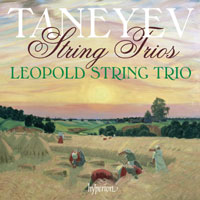
Fascinating Rarities
Taneyev string trios -
heard by
JULIAN JACOBSON'... a performance of real commitment and assurance ...'
|

|
Listening to the opening of the first and finest of the three trios on this CD, I was startled by its uncanny resemblance to the opening of Beethoven's E flat Quartet Op 127.
Listen -- Taneyev: Allegro con brio (Trio in E flat, Op 31 No 1)
(track 1, 0:02-1:09) © 2008 Hyperion Records Ltd
As the piece progresses you realise you are in the presence of a master of counterpoint: not for nothing is Taneyev sometimes known as the Russian Brahms. Yet Taneyev apparently disliked Brahms almost as much as Tchaikovsky did, and there is indeed nothing of Brahmsian sentimental idealism in these trios, recorded here for the first time together as far as I am aware.
In the splendid panoply of Russian composers, Sergey Taneyev (1856-1915) occupies an uncertain and somewhat tenuous position: neither an out-and-out nationalist like Mussorgsky, nor a big-hearted Romantic like his teacher Tchaikovsky, nor a progressive like his pupil Scriabin. Enormously talented, a great pianist (who took over the première of Tchaikovsky's first concerto after the famous débâcle with Nikolai Rubinstein), the teacher of Medtner and Rachmaninov as well as Scriabin, and a notable administrator, he was perhaps one of those musicians, like Tovey in this country, whose learning and mastery outstripped his genuine creative force. Yet actual opportunities of hearing his music have never been plentiful and anyone curious to explore the byways of Russian chamber music should be grateful for this excellent new CD.
The E flat Trio Op 31 -- the only one dignified with an opus number -- was composed in 1910-11, and it is clear that Taneyev was ploughing his own furrow with total disregard for what was going on around him, musically, socially and politically. Such learning, such bonhomie! Think Beethoven, think Mendelssohn, but do not think Russian music, late Romanticism or even Romanticism, let alone impressionism, symbolism or modernism. But is the music any good?
The answer is yes, very good, yet perhaps not quite good enough. David Brown's verdict in Grove seems to me quite accurate: 'He sometimes produced music that has real distinctiveness, though it rarely lodges for long in the memory'. But my, how civilised it is, all four movements of it!
Listen -- Taneyev: [Allegro] (String Trio in B minor)
(track 5, 2:32-3:28) © 2008 Hyperion Records Ltd
The second trio on the CD, in B minor, dates from 1913 and is less satisfying. In attempting to write a darker work, Taneyev sounds rather more 'Russian' in a generalised sense, and a little more modern in his harmonic idiom, yet he does not seem able to call on any particularly deep feelings, or to forge a truly personal idiom. The chromatic episodes, in themselves quite exploratory, sit uneasily in the generally heartily diatonic tonal language. When Tchaikovsky writes chromatic music his pen is dipped in blood and he sways us by the very force of his emotions; when Beethoven does so, it is part of the organic unfolding of his profound compositional logic. But when Taneyev writes chromatic episodes, it is a bit like a cheerfully pedantic doctor who is a little too keen to invite us into the dissecting room and show us gruesome detail we would rather he kept to himself.
Listen -- Taneyev: (String Trio in D)
(track 9, 3:46-4:41) © 2008 Hyperion Records Ltd
The final trio here, in D major, dates from 1879-80 and shows astonishing mastery for a 23-year old composer, even one who had already taken over Tchaikovsky's harmony and orchestration classes at the Conservatoire -- yet it remains composition as intellectual activity rather than as true creativity or self-expression. Buy the CD for the delightful E flat Trio. As with all the trios, it receives a performance of real commitment and assurance from this very aristocratic ensemble. I did sometimes wonder if the interpretations didn't suffer a little from the 'routine of unfamiliarity' -- a slight feeling of falling back on stock, if always thoroughly musical, responses, rather than finding the freedom and daring which long familiarity can encourage in the best performers. The recorded sound, slightly dry and clinical, enhances this feeling, though it also enables one to hear the contrapuntal detail with admirable clarity. Excellent liner notes from Calum MacDonald, never overstating the case for these neglected yet fascinating rarities.
Copyright © 16 November 2008
Julian Jacobson, London UK
 BUY CLASSICAL CDS ONLINE
CD INFORMATION: TANEYEV STRING TRIOS
PIANO MUSIC BY SERGEI TANEYEV
BUY CLASSICAL CDS ONLINE
CD INFORMATION: TANEYEV STRING TRIOS
PIANO MUSIC BY SERGEI TANEYEV
|

